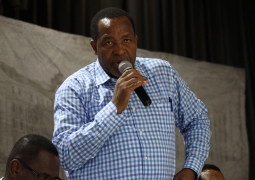
Disputed traditional leadership claims and all outstanding applications for recognition as traditional leaders, made to the Commission on Traditional Leadership Disputes and Claims, must be resolved as soon as possible, Parliament’s Portfolio Committee on Cooperative Governance and Traditional Affairs heard today during public hearings on the Traditional and Khoisan Leadership Bill in Thohoyandou, Limpopo.
Today the Portfolio Committee resumed with the last leg of the nationwide public consultations on the Bill, that seek to give recognition to Khoisan communities and their traditional leaders, as well as address limitations in existing traditional governance legislation.
Though the draft legislation continues to receive mixed reviews from the public, the intention to integrate Khoisan traditional leaders into the South Africa traditional system was generally accepted by the public.
“We appreciate the approach of consulting the citizens in the process of making law – and the intentions to recognise Khoisan traditional leaders are welcome, but don’t forget the outstanding applications made to the Nhlapo Commission. I read this Bill and my problem is that now we are jumping to recognising the Khoisan leadership while we have many other unrecognised traditional leaders in our communities,
“When apartheid took our land they also took away our traditional leadership, we still have a backlog of leaders that are not recognised, the commissions did not release the outcomes,” said Mr Ben Masiye.
The affected leaders have been advised to refrain from acting as traditional leaders until they receive the results of their applications.
Doing so will be illegal, wait for the result until your names is gazetted and proclaimed before resuming responsibilities of a traditional leadership.
Another community member told the Portfolio Committee that the Traditional and Khoisan Leadership Bill was an attempt by government to hide the failure on previous legislation on traditional governance framework.
Prince Ramovha said: “Traditional leaders are born and not elected and Bill speaks about removing a traditional leader – according to my understanding you can’t remove a king when he was not voted for.”
Mr Hlengani Phineas Chauke’s fears was that the draft legislation could bring back the old apartheid homeland boundaries.
“There are many problems, one is that it keeps the old apartheid boundaries like the Bantu Administration laws, it will only apply to the former Bantustans and this will entrench tribalism,” said Mr Chauke.
Mr Bejani Mabasa said “I have no problem with the recognition of the Khoisan, I am very impressed with Chapter 2 about the recognition of a community. it is a good Bill for traditional leadership, but I am disappointed in the recognition of the positions. I have been heading my community from 2001 and I’m not recognised as an official traditional leader.”
Mr Bejani Hlungwani said “I am challenging the Act of 1927, it created traditional leaders by recognising people who were never born to be royals and made them traditional leaders.”
The Committee Chairperson, Mr Richard Mdakane, said: “The views of the public are very important in terms of the proposed Bill. It is not a law yet – we need your views in order to come up with a law that will stand the test of time,” he said.
He said the Bill was introduced by the Cabinet to address the grievances of the Khoi and San traditional leaders who have been excluded from participating in the traditional system in the country.
In the last leg of the public hearings, the Committee is visiting Limpopo, Mpumalanga and Gauteng provinces, all the other provinces have already been visited.
By Sakhile Mokoena
27 March 2017

